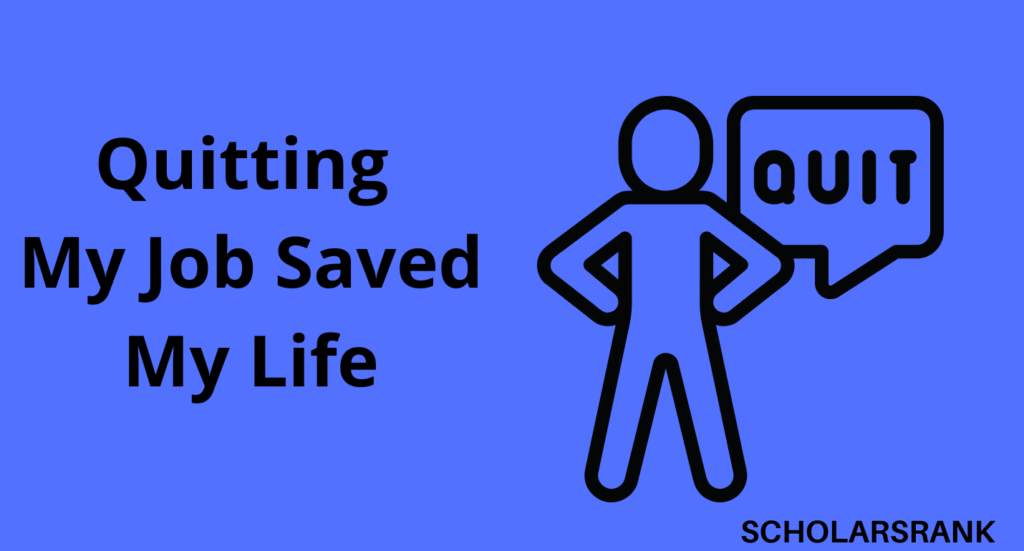Introduction
You might have heard someone says, “Quitting my job saved my life,” in some situations. Adulting, let’s face it, is difficult. You must make decisions regarding what to do, what to eat, who to date, and how to make money on your own. As if that weren’t difficult enough, you also need to decide whether to quit your work or keep it. This is for those whose feelings for their jobs are mixed. It’s not just them, though. Another group of folks has excellent careers, but their side businesses have grown to be more valuable than their day jobs.
Taking risks is dangerous. Additionally, it is challenging because the risk is adulting’s younger sister. And they’re all tough in their families. But as you’ll soon discover, taking risks occasionally can pay off.
Factors That Contribute to Quitting a Job
Over 787,000 employees chose to leave their employment in March 2022 to look for work elsewhere, according to the Bureau of Labor Statistics Employment Situation Summary.
Their readiness to say goodbye may in part be attributed to active hiring strategies: 48% of employers provide signing bonuses, 43% promote paid time off, and 40% create and publicize prestigious, more proper job titles in their job postings.
Employers are now offering to cover whole relocation expenses in the five-figure range, a luxury that was previously unheard of and only available to the C-Suite because employees refused to put up with subpar harsh working conditions and low pay.
Why Do Individuals Quit Their Jobs?
According to traditional thinking, employees quit bosses rather than jobs. While poor management is a frequent cause of resignation, it’s clear that it’s not the sole factor in job-switching decisions. According to the study, low compensation, a lack of flexibility, and few career prospects at the organization also influence employees’ choices.
According to a FlexJobs poll, the following are the primary causes of resignation:
- Unhealthy corporate culture (62%)
- Low income (59%)
- Poor leadership (56%)
- Work-life imbalance (49%).
Signs It’s Time For You To Quit Your Job
No one chooses to enter a new relationship with the assumption that it won’t work out, just as no one accepts a job with the intention that it will end in disappointment.

Things may appear very bleak if you realize that your career has turned into a cause of concern. If you have a “complex” relationship with your employment, that simply means that something isn’t functioning. How do you decide when to call it a day?
Many professionals battle valiantly to escape an unfulfilling profession. Quitting is difficult because it implies that you decided to give up, were not committed enough, or lacked the skills necessary to succeed.
The adage “Winners never quit and quitters never win” is untrue. Winners give up frequently; they simply give up the correct things when the moment is right.
This can be surprisingly challenging to accomplish. How can you be certain that your reasons for quitting are valid? How can someone who already has a job find another? Here are some inquiries you can ask yourself to assist you process your complex relationship with your employees and come to the best option possible.
- Do you disapprove of the way your employer handled your situation during the pandemic?
- Is it the coworkers you have? the society?
- Do you spend too much of your day working from a desk?
- Would you be more comfortable with a different group, manager, or role within the same company?
- Are you no longer a good fit for your current place of employment?
- Do you dread Monday mornings when you have to log in? It can indicate that it’s time to look for a new position.
- Is the uneasiness you experience passing and temporary, or persistent and long-lasting?
- Where are you at “the point of no return”? What would you never accept?
- Does the company’s mission conflict with your values?
- What would have to alter so that you could be content at work?
- Do you approve of the diversity and inclusion efforts made by your company?
- Do you have choices for remote work at your company?
- Do you have a backup plan for employment?
Where Does The Issue Originate?
Before deciding on your next career move, you should first honestly assess the situation and ascertain what is going on. Sometimes, the problem is entirely personal and has nothing to do with your professional life.
Check your fundamentals before giving up on a career since dissatisfaction or missing parts in one area of your life can likely leak over into another. Before you make any significant changes at work, identify the precise issue (health, lack of sleep, relationships, etc.).
Motives For Quitting Your Job
If you don’t already have another employment lined up, your dislike of your job may not have been a strong enough reason to quit. There may be more justifications for keeping your employment or delaying your resignation till a better moment. You may be able to change your situation and come to enjoy your workplace.
But there are occasions when giving up is the wisest course of action. Here’s how to tell when to quit your job.
- A Bad Boss
It could be time to find a new employer if your current one is a micromanager, a dictator, or simply not a good fit for your working style. Before quitting your job, search for opportunities to swap departments or work units if you still enjoy your position and your business.
- Difficult Working Conditions
Your employment might be made challenging by hostile coworkers, bad bosses, and the office atmosphere. They have the power to transform your workplace into a place you dread going to. You might have to leave once you’ve exhausted all your options.
- Returning To School
Returning to school, whether part-time or full-time, may need a change in employment. Your current job might no longer be a good fit given the demands of both your career and your school schedule.
- Hours and Schedules
You might need to quit your job and hunt for one that is more flexible when childcare is lost or your work schedule changes and you find it difficult to adjust. The ability to leave a job due to scheduling conflicts is a valid justification.
- Disease or Family Problems
Illnesses that affect oneself or a member of one’s family are both acceptable justifications for leaving a job, and a sudden illness may occasionally qualify. If you have a valid reason for quitting, such as a chronic illness you or a family member suffers from, make sure your health insurance will continue to cover you after you leave.
- A New Job
Finding a new job is the best justification for leaving a current one. But make sure you’ve explored all the basics before you leave your employment. Before you quit, make sure you have a letter of resignation, a cleaned-out computer and workspace, and a letter of the verified employment offer.
Benefits Of Leaving Your Job Before Looking for Another
Are you desperate to quit your work but lack the means to do so? When faced with such difficult choices as quitting, research is crucial to help you balance the benefits and drawbacks of making the move.
Quitting can be the best course of action if jobs in your field are often offered. However, it’s crucial to be aware that 25% of people looking for work right now have been doing so for between three and six months. It frequently takes considerably longer than this.
- Get Rid Of The Unpleasant Workplace.
After attempting to deal with a bad employer, a meager wage, nonstop hours, or an unjust work environment, many people yearn to quit their professions. Quitting your job may be the best option if your organizational climate is generating more stress than fulfillment and you’ve tried everything to modify it but haven’t been able to ameliorate the unfavorable circumstances. Don’t undervalue the risks associated with being unemployed though. Create a strategy to help you make the most of your time during your career break before you retire, and commit to preserving three to six months’ worth of income.
- Join A Network And Make New Friends.
It’s simple to forget there is a world of potential outside when you are confined to your work environment from nine to five. This may be one of the few opportunities you’ll ever have to put yourself out there, network with your contacts, meet recruiters, participate in industry organizations, interview for new jobs, and do all of that on your schedule. Both you and the people you encounter will be motivated by your ability to communicate your enthusiasm and resolve for locating a good new position.
Benefits and Drawbacks of Quitting a Job
The most liberating and terrifying event of your life may be quitting your work.
Because you understand that the organization expects you to compromise your principles to work there, you might decide to leave during the interview or before the employment starts.
If not, you leave a poisonous workplace after a little time on the job showing that your intuition was right.
There is an unwritten rule of thumb that applies in any circumstance for both good and bad situations to say, “Take this position and shove it!”
| Benefits of quitting a job | Drawbacks of quitting a job |
| New Opportunities: When a boss realizes they can count on you to complete important duties, they might be hesitant to risk giving you more responsibility. When you start at your new job, your prior employer’s mental whiteboard is empty. As a result, in the initial interview, take the initiative and start a conversation about duties that fit your capabilities. By doing this, you may provide the conditions that will let you maximize and develop untapped potential. | Employment Gaps: Nobody anticipates 20 to 30 years of dedication to their current job, but employers are leery of any inexplicable breaks. As a result, avoid hedging in your explanations. Did you, for instance, work for a year as a literacy tutor in a failing school system? Or perhaps you started a program that allowed job seekers to select their interview attire and receive complimentary haircuts? Without the need for an explanation, HR staff will investigate a potential employee’s online presence in-depth and draw their own, sometimes incorrect, conclusions. |
| A Change in Responsibilities: Reducing unnecessary obligations allows you to embark on management positions or step aside from projects that don’t allow for time for skill development or self-reflection. Examine job requirements for positions that you think might fit your needs in the future. Anything that prevents you from achieving contentment should be viewed with suspicion. Remain at your current employment until the proper opportunity presents itself if the demands restrict you from pursuing more education, ensuring the standard of living for your family, or having free time. | Career Reversals and Plateaus: Stay put for at least two years unless your steady stream of temporary jobs results in higher compensation or helps you establish yourself as the obvious choice when your direct boss departs. Your résumé screams “Unreliable” the more quickly you change jobs. The best instances of resume gaps are those related to child care, care for the elderly, and personal health difficulties. On the contrary hand, inconsistent attendance undermines or nullifies any outstanding accomplishments. |
| Salary Increases: According to a survey done by Indeed.com, 49% of job applicants said they were looking for a pay raise at their prior position. Instead, their company was not able to adhere to equal compensation among employees at the same rank on the organizational chart or did not meet or exceed the impacts of inflation. It fosters mistrust when someone receives a performance-based increase or bonus but is then required to keep quiet. Many of these winners frequently depart the organization soon after. | Income Decrease: Since so many people quit their jobs because they wanted to earn more money, it is beneficial to spend some time crunching the figures to see what would happen if you leave your current work. Before weighing them against the advantages, it would be beneficial to come up with a list of all the hidden costs. For instance, this cost must be considered if you reside in income-based housing or if your company pays for your accommodations (as in the case of military or seasonal farm employment). |
| Stress Reduction: Stability is necessary for mental wellness. Even the most sound minds can get disturbed by constant emotional abuse from poisonous employers and traumatized employees. Having this emotional baggage with you from one encounter to another makes you more tense and jittery. It causes heart attacks, strokes, hives, excruciating headaches, bodily aches, and ulcers. | Potential Networking Contacts: Losing your regular interactions means fewer fresh professional referrals because of deep relationships, even though diligent nurturing can help you preserve your professional contacts following severance. Depending on your industry, losing your network could cost you a lot of money in lost chances and sales. |
| Better Health: There will be more time to go to the gym, take an excursion to the beach, or schedule doctor’s appointments without taking up company time if you spend less time shackled to a desk completing useless things to appear busy. Request incentives and bonuses that meet your needs. | You Miss Your CoworkersAfter you leave: it’s a simple mathematical fact that you won’t be able to keep up excellent contacts with former coworkers, even if you do so on good terms. Your leaving will also probably put more pressure on your already busy coworkers, and some may not appreciate it. Someone in your old position might nonetheless disparage your credentials, dedication, and accomplishments even though you chose the high road and refrained from criticizing your former company. |
| Time for Creativity and Academic Goals Use the time between employment, as long as your savings will allow it, to take career-development classes or pursue a passion. Learn to play the guitar, enroll in a photography course, or start practicing Tai Chi or chess at a nearby park. | Loss of Mentorship: The importance of mentorship increases as you remain with a company for a longer period. When they choose to hire you, managers with years of experience and a range of backgrounds generally share their collective wisdom. A sound company’s heart and lifeblood are also provided by succession planning. To achieve a smooth transition once the CEO has left the company, it is important to identify the employees who have the best chance of succeeding him or her after retirement while mentoring and developing their careers. |
| Work-Life Balance: Some professions have a well-deserved reputation for being the first exit onto the divorce court highway. Dissatisfied children and spouses who are resentful are caused by long hours, erratic schedules, and the need for continual travel. Before you quit your career, talk to your significant other about prioritizing your family above spinning your wheels in circles. | Professional Reputational Damage: In a Bloomberg News-sponsored poll conducted by The Harris Poll, just under two-thirds of participants said they had no trouble combining a raise with an offer from another employer. On the employer’s end, though, accepting that offer did not ensure that the worker would stay. In addition, even if the phrase “May the bridges that I burn light the road” is often used, the majority of these leveraged raises caused rifts that prevented continued upward mobility in that company’s succession plan. |
Tips to Help You Quit Your Terrific Job
If you can, give two weeks’ notice. When you wish to leave your job, it’s customary to give your manager at least two weeks’ notice.
- Inform your employer in person.
- Plan out what you’re going to do next.
- Maintain a positive or neutral tone.
- Keep it succinct.
- Offer to assist with the move.
- Publish a letter of resignation.
- Say farewell to coworkers.
You might be wondering why I’m not just telling you to get your luggage and leave. After all, you despise your job. The fact is that you must act morally regardless of how you are feeling. And the proper course of action is to adhere to the law. You desire a clean break and a new beginning.
Conclusion
“Quitting My Job Saved My Life” should be what every employee should be proud to say after quitting a job.
If you’re already contemplating quitting your job, it’s probably time to change careers. But first, be sure you completely comprehend the significance of the choice. Additionally, if at all possible, try to secure your future position before quitting your current one.
Even if you despise your job, it’s always a smart option to treat your former employer with respect if you do decide to leave. You never know who might end up being an excellent CV reference. Express your gratitude for your opportunity, submit a resignation letter, and make sure to give them plenty of notice. You should also consider any setbacks as priceless teaching moments.
Frequently Asked Questions (FAQs)
How Should I Formally Quit My Job?
- Give at least two weeks’ notice while quitting your work to prevent damaging relationships. Thank your manager for the chance, and offer to assist with the transition in your resignation letter.
How Should I Respond To Queries In An Interview About Quitting My Job?
- The best way to respond to queries during an interview regarding leaving your job is to be straightforward, succinct, and upbeat. Avoid the urge to disparage your former employer.
You can also read, “Getting Fired From A Job You Hate? Here Is What To Do“








